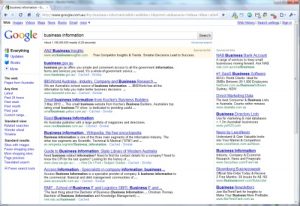As we approach the end of the current decade, it can be a good time to look back over the past 10 years to see what changes have taken place and consider what the next 10 may hold. In the search engine marketing field, the landscape is now considerably different to that in 2010, and as a result it can be hard to foresee how different the sector may be over the next 10 years, and what challenges may arise in the ’20s.
 One constant in the search market over the past 10 years has been Google, which has maintained its dominance of the sector. The search results from 10 years ago shown here are very different from the layout today, which has been driven by the growth of mobile search as well as a gradual refinement in the way search results are presented to the user.
One constant in the search market over the past 10 years has been Google, which has maintained its dominance of the sector. The search results from 10 years ago shown here are very different from the layout today, which has been driven by the growth of mobile search as well as a gradual refinement in the way search results are presented to the user.
The core of Google’s search algorithm also remains the same, focused around words and phrases, but the interpretation of meaning and intent (such as with RankBrain) has created a need for better, unique content that serves a purpose. Voice search is also becoming a more widespread tool, while the importance of links also remains a key ranking factor but the whole focus of this has changed considerably over this time and will still be a key challenge for many SEO marketers.
The paid search market has also undergone some major changes, both with the interface and branding (AdWords is now Google Ads) along with the many elements of targeting searchers with a variety of ads and messages. The main change here has been with the automated bidding options and the advancements in Google’s machine learning to create better results, although the jury is still out in terms of how effective this can be, at least in some markets.
So what might be the main areas of focus in the coming years as the 2020’s develop? With regular and ongoing developments in both the search and social marketing fields, this is a difficult area to predict with any certainty, but these are likely to be the key factors for many:
Mobile – with mobile use now widely established, this will continue to grow across all aspects of the online world, with search having to play a more effective role on the small screen, both in terms of position and also landing pages / conversion optimisation once the click is achieved. The widespread dependence on mobile interactions will drive many of the coming developments on online marketing.
Flexibility – as the online market becomes more granular with many more opportunities and approaches that can be considered by marketers, the need for companies to remain flexible and responsive to these changes will be vital. This can give smaller companies better opportunities with faster responses – before larger corporation catch up – and so being aware of the market changes and having the flexibility, combined with a clear strategy, will be a key business strength.
Integration – combined with the above point will be the need to integrate the different online approaches that may be available to reach a market. From search, social, video, banners, email, texts and other channels, the use of any of these channels needs, as always, to have a clear strategy to reach the target audience in the best possible manner and with the right message.
Personalisation – the online market has developed a strong element of personalisation based on past activity, although the privacy lobby – including some browsers – are now starting to limit some of this tracking through restrictions on cookies. However, marketers still need to consider the role of past behaviour when looking at future results, and adapting channels and messages to best suit the different target audiences that are out there.
Data – there is already a considerable amount of data being collected and available online for marketers, and this will remain a core tool in understanding performance and testing new approaches. Data is also a core part of marketing management, whether using manual or automated systems, and the quality and extent of data being provided is likely to become even better.
The above suggestions are some of the broad areas that are likely to be key in the next decade. However, one thing is certain, nobody can accurately predict what the market will be like in another 10 years time, with technological advances on one side, and government restrictions on the other, plus possible changes in personal behaviour.
As ever, the market will evolve over the coming years, and online marketers will need to remain informed and creative to make the most of the developments to get the most benefit for their business.
If you’d like to know more or have your own thoughts on the priorities for the next decade, please get in touch.
